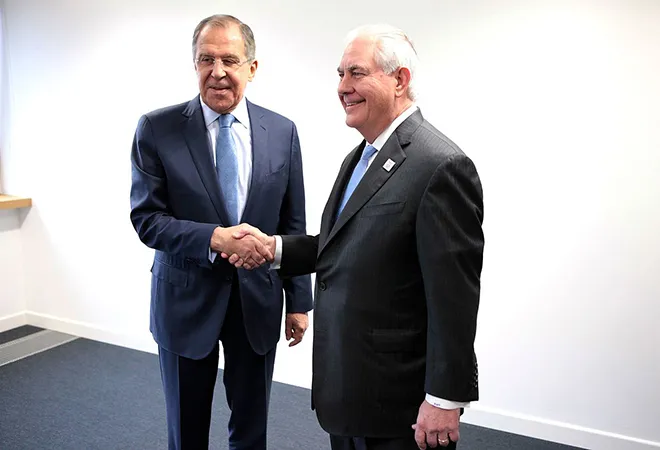Russia hosted a six-nation conference on Afghanistan’s future in Moscow two weeks ago which saw participation from India, Iran, Pakistan, China and Afghanistan. This was Russia’s second initiative after the first trilateral conference in December last year which only included China and Pakistan. These Moscow talks come almost 38 years after the Soviet invasion of Afghanistan in December 1979 and underscore a significant shift in Russia’s Afghanistan policy.
After facing flak for not inviting Afghanistan to the December conference on the nation’s future, Russia decided to broaden its outreach by inviting India, Iran and Afghanistan. The Afghan government had registered a strong protest after its exclusion from the December conference, underlining that regardless of the intentions of the participants, excluding Kabul from the talks would not help the situation in the country. “Even if such talks are organized with good will, it cannot yield any substantial results because no one from the Afghan side is there to brief the participants about the latest ground realities,” Kabul had argued.
This became even more significant as the December conference agreed upon “a flexible approach to remove certain figures from sanctions lists as part of efforts to foster a peaceful dialogue between Kabul and the Taliban movement.” The three states also underscored their concern “about the rising activity in the country of extremist groups, including the Afghan branch of IS ” and underlined that the Taliban was a necessary bulwark in the global fight against the IS. This took Kabul as well its other partners like New Delhi by surprise.
Read also | < style="color: #960f0f">How Russia gave a blow to India’s stakes in Afghanistan and later made it up to Delhi
This time Moscow was more careful. It invited most of the regional stakeholders even as the US and the NATO were pointedly left out. It was left to Afghanistan to underscore the centrality of the US in the unfolding dynamic in the country by pushing for the inclusion of the US as one of its most important partners to “end war and usher in sustainable peace in Afghanistan.” Afghanistan also took on Pakistan at the conference when it underlined the need to “effect a change in the behaviour of certain state actors” in order to end the violence that has reached record levels in the last year. In fact, Afghanistan strongly pushed back against the “good Taliban, bad Taliban” discourse being championed by Russia, China and Pakistan when its representative at the talks, M. Ashraf Haidari argued that “the key challenge to the process remains a policy selectivity by some to distinguish between good and bad terrorists, even though terrorism is a common threat that confronts the whole region, where if one of us doesn’t stand firm against it, others’ counter-terrorism efforts will not bear the results we all seek.”
Read also | < style="color: #960f0f">The nuclear deterrence dialogue in Asia
This was of course welcomed by New Delhi which too underlined the need for Afghan-led and Afghan-owned reconciliation efforts only to be facilitated by “friends and well wishers of Afghanistan.” India also reiterated that denying “safe havens or sanctuaries to any terrorist group or individual in countries of our region,” remains central for the long-term stability of Afghanistan.
It was ironic that the Moscow conference happened at a time when Afghanistan-Pakistan ties have hit their nadir. More recently, after a spate of terror attacks in its territory, Pakistan has accused Afghanistan of not doing enough to go after armed groups that launch attacks in its territory. Pakistan Army has even moved heavy artillery to the Pak-Afghan border. As Washington remains distracted by the seemingly never ending drama in the White House, Russia wants to fill that vacuum in South Asia by taking a lead on Afghanistan. Its engagement with Pakistan has been gathering momentum and its partnership with China is aimed at becoming a global bulwark against the West. It is in this wider context that emerging fault-lines in South Asia become important. It is not simply Afghanistan but the very future of South Asia is at stake.
This commentary originally appeared in DNA.
The views expressed above belong to the author(s). ORF research and analyses now available on Telegram! Click here to access our curated content — blogs, longforms and interviews.




 PREV
PREV


